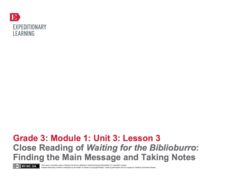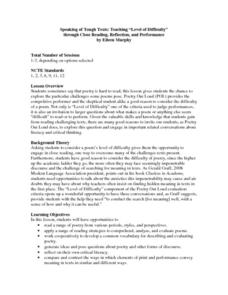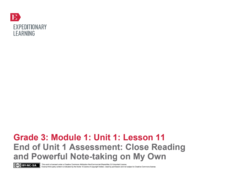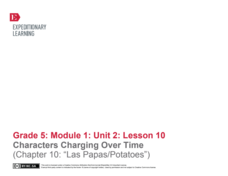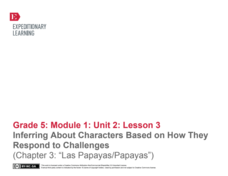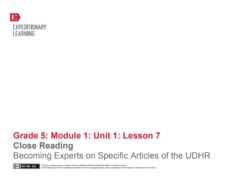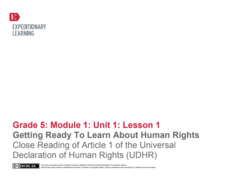EngageNY
Close Reading of Waiting for the Biblioburro: Finding the Main Message and Taking Notes
Expose your class to Waiting for the Biblioburro, narrative nonfiction that will act as the bridge between ficiton and informational texts to come. Class members do a close reading of the text, looking at excerpts instead of the whole...
EngageNY
Continued Close Reading of Waiting for the Biblioburro: Comparing and Contrasting the Children in Colombia, Appalachia, Chad, and Afghanistan
Focus on similarities and differences with a jigsaw activity that requires pupils to compare Waiting for the Biblioburro to other texts they have read. To prepare, class members first respond to text-dependent questions, moving on to...
Curated OER
Teaching “Level of Difficulty” through Close Reading, Reflection, and Performance
What makes a poem difficult? Explore that topic and more with your class as you work through the lesson detailed here. Using materials from Poetry Out Loud, a national recitation contest, individuals or small groups examine poems and...
EngageNY
Close Reading of The Boy Who Loved Words: How Do People Build Their Word Power?
Third graders practice the skills of identifying the main message in a story, describing the main character, and sorting the key details of a story into specific categories. The story they read is, The Boy Who Loved Words. Using a...
EngageNY
End of Unit 1 Assessment: Close Reading and Powerful Note-Taking on My Own
As the final lesson plan in a larger beginning-of-the-year unit to establish routines and teach close reading skills, this plan is designed as an assessment piece. Using the story, The Librarian of Basra, learners independently complete...
EngageNY
Close Reading of Nasreen's Secret School: How Do People Access Books in Afghanistan?
Third graders continue to practice the close reading skills of capturing the gist and reading again for important details in the sixth lesson in a larger unit. This is a great beginning-of-the-year unit for establishing visible thinking...
EngageNY
Characters Changing Over Time (Chapter 10: "Las Papas/Potatos")
Engage further in Esperanza Rising with a focus on close reading and metaphor. Class members zero in on the tenth chapter, examining characters and big ideas. Pupils discuss the text in small groups and as a whole class, and participate...
EngageNY
Understanding Themes in Esperanza Rising
Determining a theme or central idea is greatly emphasized in the Common Core standards. Target that skill though big metaphors and central symbols in Pam Muñoz Ryan's Esperanza Rising. Help your class reach the standard through...
EngageNY
Inferring About Characters Based on How They Respond to Challenges (Chapter 3: "Las Papayas/Papayas")
Start off your day with a quick reading comprehension quiz about chapter three of Esperanza Rising by Pam Muñoz Ryan. After they complete the quiz, pupils participate in a discussion and look closely at the text. A strong Common Core...
EngageNY
Getting to Know Esperanza (Chapter 2: “Las Uvas/Grapes”)
Delve into Esperanza Rising by Pam Muñoz Ryan with close reading and evidence-based, text-dependent questions. Part of a unit series, this well-sequenced, Common Core designed instructional activity draws on material from the previous...
EngageNY
Close Reading: Becoming Experts on Specific Articles of the UDHR
A continuation of the previous lesson, which is part of a larger group of lessons on human rights (see additional materials). Here, in Lesson 7, your class will explore more articles from the Universal Declaration of Human Rights. After...
EngageNY
Close Reading: Unpacking Specific Articles of the UDHR
Lesson 6 of this extensive unit finally has your class begin to work their way through specific articles from the text of the Universal Declaration of Human Rights (UDHR). Before examining the rights actually detailed in the document,...
EngageNY
Close Reading: The Introduction to the Universal Declaration of Human Rights
As part of a group of lessons, your class will return to the primary text for this unit, the Universal Declaration of Human Rights. Key vocabulary as well as close reading strategies continue to be the focus skills; however, this lesson...
EngageNY
Getting Ready to Learn About Human Rights: Close Reading of Article 1 of the Universal Declaration of Human Rights (UDHR)
Introduce young readers to informational texts with a well-designed, ready-to-use, and Common Core-aligned unit. Young readers learn a variety of skills while studying the Universal Declaration of Human Rights (UDHR). As the first...
Curated OER
Because of Winn-Dixie
Readers analyze an excerpt from Kate DiCamillo's novel Because of Winn-Dixie. They read silently, and then hear it read aloud. Definitions for underlined vocabulary words are in the margin, and other potentially difficult words are in...
Curated OER
Reading Comprehension 4: Level 8
Need a quick but comprehensive reading strategies exercise? Even your most reluctant readers will be engaged by the story of a nuclear reactor explosion at a top-secret Idaho base. After reading the short passage, learners answer nine...
Curated OER
Reading Comprehension 6: Level 9
Did you know that an acre of trees can absorb as much carbon dioxide as a car emits in 11,000 miles of driving? Such fun facts abound in a short reading comprehension passage detailing the benefits of parks and rooftop gardens. After...
National Endowment for the Humanities
The Monroe Doctrine: A Close Reading
Young scholars identify specific passages in the Monroe Doctrine to events in early U.S. diplomacy.
Curated OER
Analyzing Poetry
Use this poetry analysis worksheet to help your learners understand a poem of their or your choosing. This resource asks class members to summarize the poem and analyze it by looking at voice, word choice, imagery, and theme. The...
Curated OER
Lesson 2-Profiles in Courage: To Kill A Mockingbird and the Scottsboro Boys Trial
Review one of the most memorable cases in the history of the United States. After reading To Kill A Mockingbird, young scholars read and select court transcripts and other primary source material from the Scottsboro Boys Trial of 1933....
Curated OER
Poetry Introduction: Reading Strategy and Response
Fifth graders analyze a poem. In this poetry analysis lesson students read a poem, analyze it, and write a response. They write about their own thoughts on the poem's meaning and any feelings they have about the poem.
Curated OER
The Sun Also Rises: A Close Look at the Cloze
A passage from Ernest Hemingway's The Sun Also Rises offers class members an opportunity to demonstrate their reading comprehension skills.
Maine Content Literacy Project
Exploring Text with the iMovie Application
Get your class going on one of the final assessments for a unit on short stories by introducing iMovie and its main features. In this tenth lesson in a series of fourteen, pupils take some time to explore iMovie before conducting an...
Tennessee State Museum
Deciphering the Document: Unlocking the Meaning of the Emancipation Proclamation
Help your learners truly understand the Emancipation Proclamation by asking them the put it into their own words. After reading the document out loud to the class, and briefly discussing the legal language, split your class into small...


